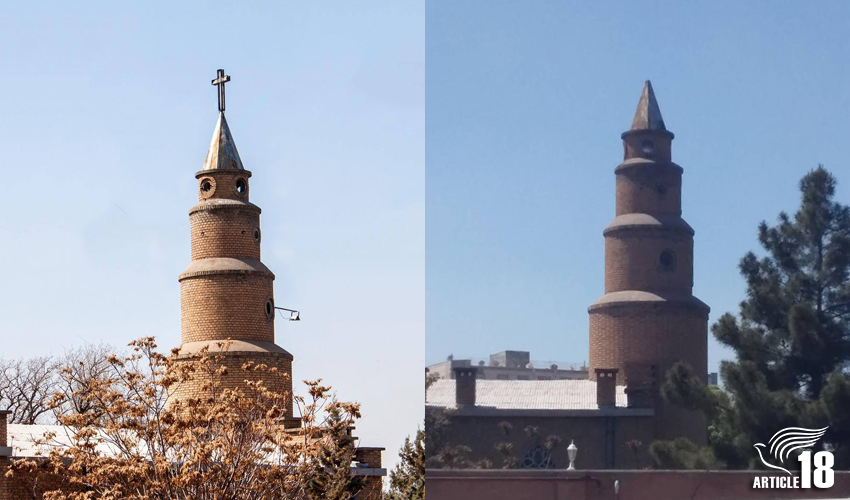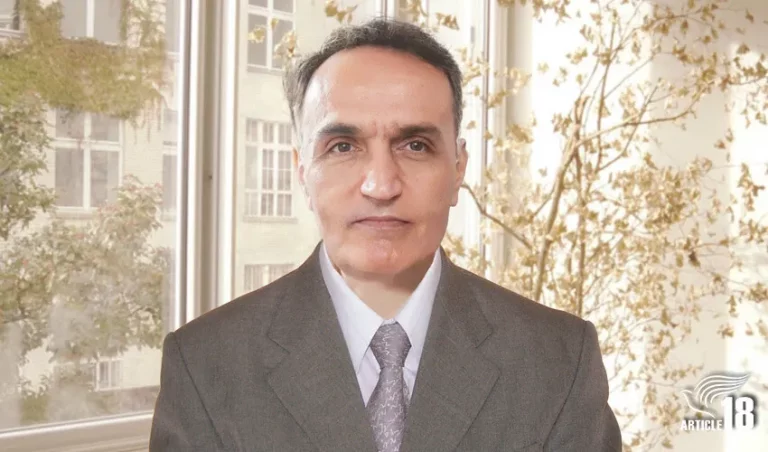This case study was used as part of a UK government-funded report into the persecution of Christians worldwide.

Case referenced by
Article18, Assyrian International News Agency, Iranwire, Radio Farda, World Watch Monitor, Voice of the Martyrs Canada.
Case Summary
On 9 May 2019, the Ministry of Intelligence, together with the Execution of Imam Khomeini’s Order (EIKO), forcibly closed down the Assyrian Presbyterian church of Tabriz, in the northwest of Iran. The intelligence agents changed all the locks, destroyed the cross from the church tower, and ordered the church warden to leave the premises immediately, while they installed CCTV and other monitoring systems in and around the premises.
Case in full
On 9 May 2019, “a large number” of agents from the Ministry of Intelligence (MOIS) and EIKO raided and forcibly shut down the Assyrian Presbyterian church of Tabriz, in the northwest of Iran. The intelligence agents changed all the locks, destroyed the cross from the church tower, and ordered the church warden to leave the premises immediately while they installed CCTV and other monitoring systems in and around the premises.
The MOIS raid was not unexpected. Prior to the incident, during Christmas 2018, Armenian and Assyrian church leaders from other churches in the country were prevented from visiting the church and conducting a joint worship service. According to Article18’s inside-country source, the church members anticipated such an incident and had been fearful since Christmas 2018.
Furthermore, in 2011, the church was raided and “confiscated” by the order of the Revolutionary Court, under Judge Hassan Babaei. Nevertheless, the church members were able to continue using the building to conduct their services in the Assyrian language until 9 May 2019. The church had been banned from using the Persian language for their worship services for more than 30 years.
Legal background and case analysis
The church belongs to the Assyrian Presbytery and has been listed and officially recognised as a National Heritage site with 100 years of history. The church was confiscated by the order of the Revolutionary Court under Judge Hassan Babaei in 2011; however, the church members were able to continue using the building to hold their services until 9 May 2019 and the intervention of EIKO and MOIS agents, who were responsible for the raid and the closing down of the church. Both institutions are under the direct supervision of the Supreme Leader, Ayatollah Ali Khamenei. Neither of them has provided the church with any clear explanation or reason for the raid and the closing down of the church.
On 25 May, the Assyrian representative to the Parliament, Yonathan Betkolia, wrote an open letter to President Rouhani urging him to re-open the church and reinstall the cross on the church tower.
At the time of writing, there had been no response to the letter from the authorities, but on 9 July a pro-government news agency in Iran claimed the Assyrian church in Tabriz was never in fact forcibly closed, and that its cross fell down, rather than being torn down, and was replaced after being repaired.
The majority of churches owned by Protestant denominations have been closed down in recent years or banned from using the Persian language for their worship services, as was also the case for the Presbyterian church of Tabriz. Furthermore, in most cases where churches have been closed, the government has not been able to legally repurpose them, especially if the building is listed. As Mansour Borji, Advocacy Director of Article18, stated: “Churches typically remain as empty buildings, until they turn into ruins, before being bulldozed, such as was the case with the Episcopal church in Kerman”. In some cases, after the confiscation of the church, the government may allow the church to look after the listed building, but ban them from holding any church services, except occasional prayers under strict control of the authorities – for example, in the case of the Episcopal church of Shiraz.
Iran’s constitution provides for and protects religious freedom for Christians (ethnic Assyrians and Armenians), Zoroastrians and Jews. Armenian and Assyrian Christians have been relatively free to practise their faith. However, Protestant churches that attracted Muslims or that accepted Muslim-background Christians or held services in the Persian language have been forced to close or stop their services in Persian and reject their Muslim-background members. If a church or church leader did not follow their orders, they could face severe punishment. One such example is the case of Pastor Victor Bet-Tamraz, an Assyrian pastor, who refused to stop his Persian-speaking services in his church in Shahr-Ara, Tehran. The Ministry of Intelligence temporarily closed his church. After MOIS warnings, the church leadership dismissed Pastor Bet-Tamraz and stopped the Persian-language services. MOIS then reopened the church. However, the story did not end there. On 26 December 2016 plain-clothed security officers raided Pastor Victor Bet-Tamraz’s house and arrested him. Later, he was sentenced to 10 years in prison, charged with “actions against national security”. After losing his appeal, he and his wife fled the country in August 2020.
USCIRF in its 2019 Annual Report stated that religious freedom conditions in Iran are moving in a “negative direction”; the government “systematically” targets Christians; they repeatedly raid churches and house-churches, harass, detain and imprison Christians; Muslim converts to Christianity continue to face “severe persecution”; many have been sentenced to prison for holding private Bible-study gatherings in their homes. In 2018, at least 171 Christians were arrested, as Article18 noted in its annual report, including 114 in just one week in early December.
Views of local Christians
The members of the church of Tabriz were left in a state of shock, though they had foreseen such a situation since Christmas 2018 when the state did not allow pastors from other churches to visit their church. The locals also reported that the intelligence agents made it clear that Assyrian Protestant Christians were no longer allowed to practise their faith in the building. The local Christians believe that the closing down of the church was part of the government’s agenda to close down all Protestant churches in the country.
Diplomatic involvement
There was not much diplomatic involvement in this case, however USCIRF in a tweet on 24 May said: “USCIRF is deeply concerned by reports that an Assyrian Presbyterian church in Iran was forcibly closed earlier this month.”



0 Comments
Trackbacks/Pingbacks